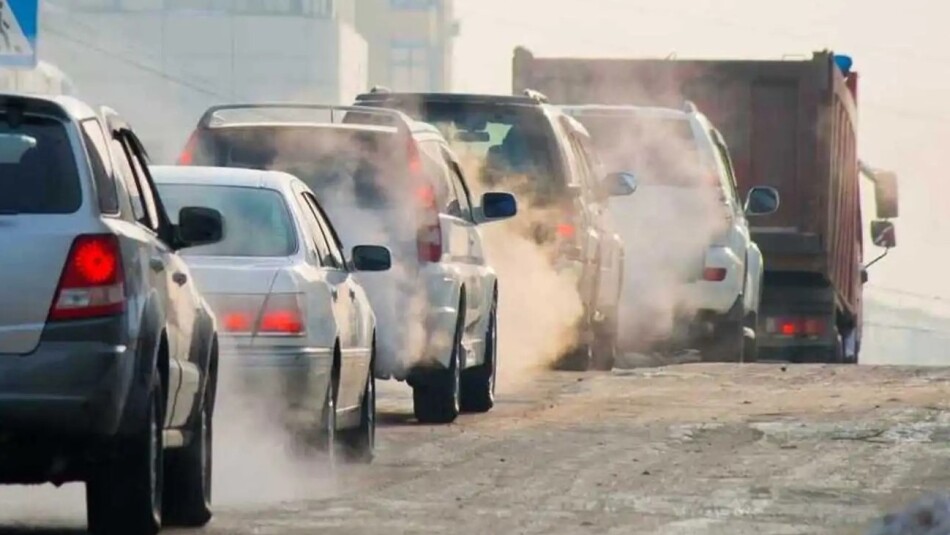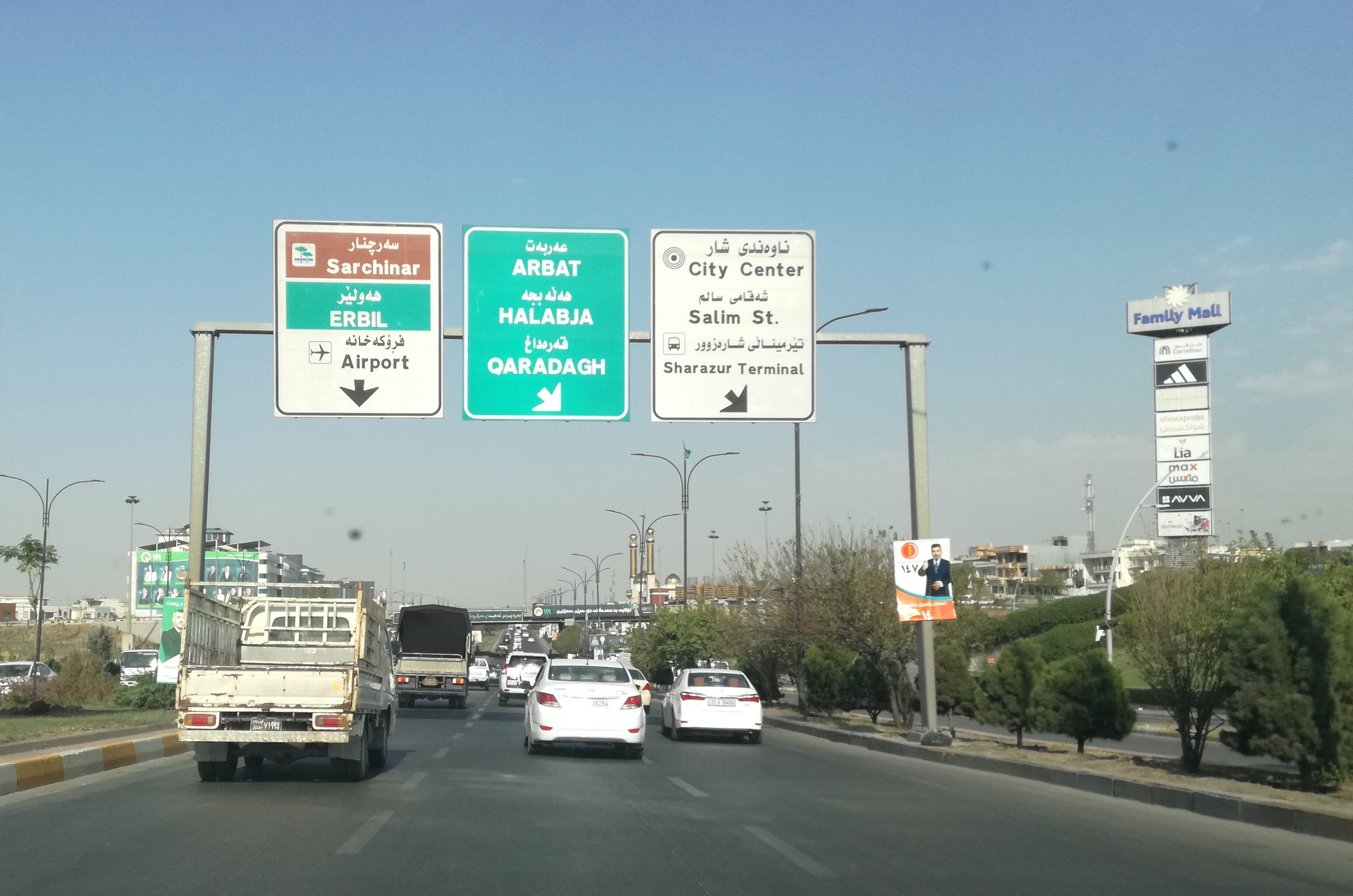
On King Mahmoud circle Street in Sulaymaniyah Northern Province, a truck overtakes the car that Sanaria is driving, and the thick smoke emanating from its exhaust affects her vision.
At this moment, Sanaria slows down and takes out her mobile phone to film what she sees in front of her and sends it to the traffic police department to hold the truck driver accountable and deter him from continuing to pollute the environment.
Throughout the day, the streets of Sulaymaniyah are crowded with vehicles, and in addition to the difficulty of driving vehicles, the pollution rate in the city is steadily increasing.
Sanaria has many stories with toxic fumes and traffic congestion because she has become the one driving the family car after her husband suffered a heart attack.
Every morning, Sanaria leaves her home in the Kana Soura neighborhood, south of Sulaymaniyah, with her two-year-old child, at 6:45 to take her husband by car to one of the government departments east of the city. The trip is supposed to take 15 to 20 minutes, but due to traffic it takes 30 minutes.
"Although our departure time is very early for my husband, one of us has to sacrifice, otherwise I won't be able to make it to work. I can't make excuses to my boss every day for being late," Sanaria Ahmed told KirkukNow.
According to statistics from the Kurdistan Regional Government KRG's Environmental Protection Authority, there are 2.4 million vehicles in the region, 60% of which are private. The large number of cars means more fuel is burned, which pollutes the environment.
One of the reasons for environmental pollution in the region is the large number of cars on the streets, most of them private
"One of the reasons for environmental pollution in the region is the large number of cars on the streets, most of them private, due to the weakness of the public transportation sector," Razzaq Khilani, Environmental Protection Authority spokesman, told KirkukNow.
According to IQ AIR, a Swiss company working in the field of air quality technology, Iraq's air is among the "most polluted" in the world. According to the KRG Ministry of Health, environmental and air pollution is one of the reasons for the increase in cancer cases, as 9,911 new cases were recorded in the Iraqi Kurdistan Region IKR in 2023, with lung cancer being the second most common.
The air quality in the IKR, if acceptable in the past ten years, is now poor and has exceeded the specified rates and standards, especially within cities. Pollution has also affected villages due to the excessive use of chemicals and forest and jungle fires, according to what Yerevan Shaswar, master’s degree in air quality, told (KirkukNow).
Public buses in IKR operate according to the passenger system. The bus does not leave the first station unless the number of passengers reaches 10 passengers. Sometimes this takes a long time, while others at other stations are forced to wait for a long time for the bus to arrive, so most of them resort to using taxis or their private vehicles.
Asaad Mulla Karim, a director of the region’s traffic department, told (KirkukNow), “The public transportation sector is definitely weak in cities and districts and does not meet the required needs, which forces citizens to use private vehicles for transportation.”
In most countries, alternative energy systems are currently being developed, including the production of electric cars instead of cars that run on gasoline and diesel, with the aim of protecting the environment and confronting climate change. According to statistics and warnings from the United Nations, Iraq ranks fifth among the countries most affected by the repercussions of climate change.
Senaria spends more than an hour on the roads every day. After taking her husband to his office, she has to take her child to the nursery and catch up with her work at a media institution located west of the city at 8 am.
“This has been my daily suffering for three years. The hour I spend on the street is rush hour and everyone wants to catch up with their work. The street is full of private vehicles. At the beginning of the school day, the streets are crowded,” says Sanaria.
The city bus service or night buses on King Mahmoud Street is one of the public transportation projects that are being theoretically developed, but its implementation has been halted due to the lack of government support.
"We have dozens of projects and plans to enhance the public transportation sector, not only in Sulaymaniyah but throughout the region, but they are faltering due to the lack of financial support,” Siddiq Muhammad, the director of Transportation and Communications in Sulaymaniyah, told (KirkukNow).

“For example, we designed the tram line for the city of Sulaymaniyah 12 years ago, which cost three million dinars (USD2,000), but there is no one to implement it. The design is sitting on the directorate's shelves."
The US Environmental Protection Agency - which most countries rely on to set environmental pollution laws and standards - measured six main air pollutants that affect human health if the specified percentage is exceeded.
The pollutants are: ground level ozone, suspended air particles, carbon dioxide, nitrogen dioxide, carbon monoxide and lead.
All pollutants are high in the IKR
Shaswar says that all pollutants are high in the IKR, for example, suspended air particles with a diameter of less than 2.5 microns that are easily absorbed and enter the human lungs should not exceed 15 micrograms in the air according to standards, but their percentage in the cities of the region currently reaches 65 micrograms.
In addition to vehicles, electricity generators, factories and oil refineries pump toxic fumes into the air daily.
According to air quality expert, the air in the Kurdistan Region, especially inside the cities, is "polluted", so she believes that it is necessary to have a law that sets air pollution standards like most countries and to have local standards, in addition to "preventing the import of vehicles that do not comply with international standards and vehicles with large eight-cylinder engines".
The Environmental Protection and Improvement Law No. 8 of 2008 in the Kurdistan Region set severe penalties for environmental pollution, including imprisonment and fines of up to 200 million dinars.
Environmental Protection Agency Spokesperson pointed out that his department had recently sent a letter to the Ministry of Interior requesting that vehicles without exhaust gas (environmental stone) not to be registered.
Environmental stone works to reduce harmful emissions from the vehicle's exhaust and resulting from the process of burning fuel inside the engine.
“The Ministry of Commerce and the Directorate of Standardization and Quality Control at the Ministry of Planning were also informed not to allow the entry of cargo vehicles that emit heavy smoke,” Khilani added.
"If the concerned authorities had taken our letter into consideration, these vehicles would not have been on the streets."
Due to the lack of public transport buses on Malek Mahmoud Street, Sanaria's husband is forced to return home by taxi, which constitutes a financial burden on the family.
"If the public transport lines were effective and the people were assured of arriving at his destination on time, this large number of people would not have used their private cars. I think this is not a difficult matter. The concerned authorities only have to follow the example of neighboring countries," Sanaria says.
Most public transport buses are old and do not have air conditioning systems, which is another reason that drives citizens away from using buses.
The Director of Transport and Communications in Sulaymaniyah said that his department has repeatedly addressed the Ministry of Transport regarding transportation problems, but "the government does not allocate funds to develop public transport and does not support the private sector to invest in this field."
Air pollution is a global problem, but one solution lies in increasing green spaces through afforestation.
Shaswar says that to ensure a clean environment in any area, the percentage of green spaces should not be less than 25%, and according to the World Health Organization WHO, in order for a person to live in a healthy environment, nine square meters of green spaces must be allocated for each person, "but the percentage in Sulaymaniyah for each person is three and a half meters, and this percentage decreases in Erbil to reach only two square meters."
According to the laws and regulations in force, an amount of 70,000 IQD is collected from owners of freight vehicles, 30,000 from owners of taxis, and 20,000 from owners of private vehicles during annual renewal as fees taken under the name of preserving the environment and maintaining roads.
The spokesman for the Environmental Protection Authority in the region believes that the air in the cities is polluted, but the pollution rate does not reach a threatening level. "If the factors of air pollution, especially vehicles, generators and refineries, remain as they are, the pollution rate will increase, so the causes of pollution must be stopped."
The WHO warns that air pollution inside and outside homes is a major threat to life and climate and leads to the premature death of seven million people annually.
The time is approaching four in the afternoon and the same suffering is repeated for Sanaria, as she will spend about another hour in the crowds and toxic fumes of vehicles until she reaches home.
"Today's marathon, is a six day a week routine that I face alongside my other household burdens."
This material was produced within the framework of the program to expand the role of women in covering environmental issues. The program is implemented by the (Kirkuk Now) Media Outelet with the support and funding of the Federal Ministry of Foreign Affairs of the Federal Republic of Germany.